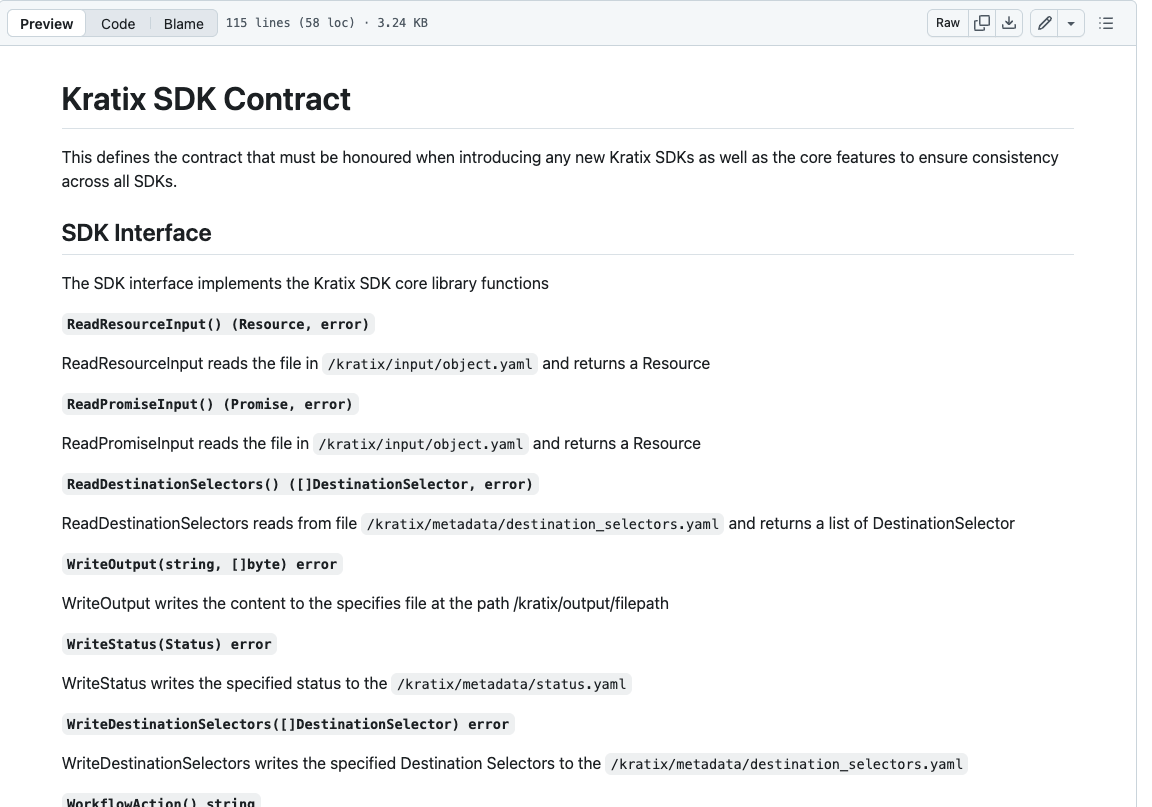Introducing the Kratix Promise-writing SDKs: Faster, Easier, More Testable
These SDKs excel at everything from bootstrapping the initial Promise for your organisation's platform to ensuring consistency and testability across all the Promises your platform teams create.
Defining and building platform APIs and services is no easy task in general. Platform engineers who adopt Kratix and create bespoke services – which we call “Promises” – often encounter a significant "wall of bash" when starting their journey towards taming their underlying IaC config, YAML, and API calls.
Our community has shared the challenges of bootstrapping custom Promise workflows with us. They often resort to bash scripts for simplicity, only to hit the proverbial brick wall when adding more functionality, running tests, or managing repetitive code for common tasks like validation or file I/O interactions.
This is why we are thrilled to announce the launch of our brand-new Promise-writing Software Development Kits (SDKs) in Python and Golang. These completely remove the complexity of common Promise-specific interactions for every team writing promises. Available to everyone in the Kratix community, these SDKs also serve as a template for teams to create their own SDKs in the language of their choice and share them with the community!
Why Create Promise-writing SDK for Kratix?
We believe it should be easy to write Promise stages in the language of your choosing, focusing only on the business logic unique to your organisation and Promise. No more rewriting everything in a more testable language three months down the line, once you realise bash doesn’t quite cut it.
Our new Promise-writing SDK directly tackles those pains head-on. It empowers platform engineers to focus solely on the unique business logic that truly matters to your organisation in a language that your team knows like the back of their hands. This SDK simplifies those common, repetitive tasks that previously required significant manual coding, such as:
- Handling file I/O interactions and validation: Crucial for ensuring data integrity and simplifying the process of writing to output directories, ensuring anything you output will be in the right format.
- Reading Promise and Resource inputs: The SDK automatically parses YAML inputs, dynamically loading custom inputs as object properties, completely eliminating manual coding for Promise developers.
- Clear, mockable interfaces: Promises can now be unit tested via these interfaces, improving feedback cycles and reducing risk to your platform when new promises are added.
Extending the Kratix CLI: SDKs, Specifications, and Contracts

The SDK is built around a clear, open-source contract. It is written in Markdown and can be found in the Kratix repo. This contract isn't just a guide; it's a specification to encourage and support community contributions of SDKs in various languages, ensuring consistency and parity across implementations. Each SDK will live in its own open-source repository, making it simple for the community to consume and contribute.
And finally, to make things even easier, we’ve integrated these SDKs into our Promise-writing CLI, meaning you can pre-load your generated Promises with pipeline stages in Go or Python. In the video below, our team shows how to use the CLI to build your own, bespoke Python promise in under 3 minutes!
The Promise-writing SDK is a significant step towards reducing the time it takes to write Promises, which massively increases their testability, too! We’re excited to see the community rally around this initiative, and to support them, we'll be working hard to integrate examples and documentation into the Kratix CLI and our workshops, making the onboarding experience unbelievably easy.
Get Hands-on with the Kratix SDKs: Feedback is Welcomed!
Join our Slack community, where we’ve created a channel for the Promise-writing SDKs (creatively named #promise-writing-sdks) to get feedback, share ideas and support community members who want to build one in the language of their choice. If you want to get hands-on right away, check out the Python and Go SDK repositories on GitHub, or the contract in the Kratix.io repo and let us know your thoughts!

